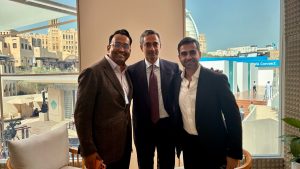Last October, the UN Intergovernmental Panel on Climate Change issued a dire warning: Climate change could trigger “unprecedented” changes to life on this planet by the year 2030. Disasters such as droughts and flooding could lead to hundreds of thousands of deaths, the panel said.
Clearly, we can no longer ignore the impact of climate change on the environment.
Now, you might ask: What can I possibly do as the owner of a small or medium-sized business to make a truly meaningful difference in curbing the effects of climate change?
(Sponsored)

OCOBIA eyes Ottawa BIA expansion as it gears up for election year
Michelle Groulx says it’s not difficult to spot the Ottawa neighbourhoods with their own business improvement area (BIA). That’s because, she says, BIAs are a visual and experiential representation of

From Davos to WGS: The new mindset of global capital, and what it means for Ottawa
Dr. Anirudh “AK” Kumar sits in CarMa’s headquarters at the ByWard Market, still visibly energized despite having landed from Dubai less than 24 hours ago. The founder and CEO of
Quite simply, a lot.
According to the Canada Revenue Agency, small and medium-sized enterprises make up nearly 98 per cent of all businesses in this country, employing two-thirds of Canada’s workforce.
The people behind these businesses fight every day to keep their companies relevant as we prepare for the economy of tomorrow. In doing so, they develop the knowledge, skills and talents necessary to combat climate change in an efficient way.
For too long, our key policy-makers have focused on broad strategies to curb greenhouse gas emissions at the expense of practical solutions. It’s time for all of us in this country to roll up our sleeves and do what we can as individuals – and individual businesses – to fight the devastating long-term effects of climate change.
Everyone, especially those in small businesses, can make a huge difference. We no longer have the luxury of time to argue if we can afford it. We are out of time to debate who should lead the way.
I am writing this as a representative of OpenConcept Consulting, a digital agency that has been delivering digital products in the Ottawa market for 20 years.
Our company is a member of Carbon 613, a network of community organizations working to set targets to reduce carbon dioxide emissions. As a member of Carbon 613, each year we provide data on our usage of utilities such as hydro and natural gas and our air travel information.
A Carbon 613 membership provides access to a carbon accounting tool that helps us measure our impact on the environment. Our belief is that by measuring that impact, we are already starting to change our mindset and behaviours.
As a member of Carbon 613, every year we have to measure our impact, buy offsets and set goals for reducing our carbon imprint for the following year. There are times when we end up performing activities that contribute to climate change – one relatable example is air travel. We measure our air travel impact with help from Carbon 613 in a shared document listing our flights, distance and number of people who travel.
Once we know our air travel carbon footprint, we buy Canadian-based offsets through Less, a Bullfrog company. This money goes back into Canadian projects that are reducing our carbon footprint as a country. Less maintains that “offsetting is an imperfect solution to the complex issue of climate change” and is only offered as a last resort.
OpenConcept is also part of a network of businesses looking to measure their social, environmental and cultural impact and find ways to enhance it. This network is known as the Certified Benefit Corporation community.
By no means are we a perfect organization, doing all the right things for the environment 100 per cent of the time. We are human beings, and each day we make human mistakes. But through organizations such as Carbon 613 and the B-Corp network, we are making a sincere effort to be a force for positive change.
I am not proposing that we as small business entrepreneurs need to be perfect, but I am suggesting we need to strive for it. If we all start believing we have a role to play in reducing climate change, then this mindset is the fuel for taking action.
The impact of climate change on our future lives is too big, too urgent and too relevant for us to ignore. At this stage, it is much bigger than each individual, each business and (dare I say it) each government. Only if we work together, using our collective energy and expertise, can we do something that will change this trend within the next decade.
As Margaret Mead said: “Never doubt that a small group of thoughtful, committed citizens can change the world; indeed, it’s the only thing that ever has.”
Shalini Nagrani is the general manager of OpenConcept Consulting and a part-time student pursuing her master’s degree in psychology.






